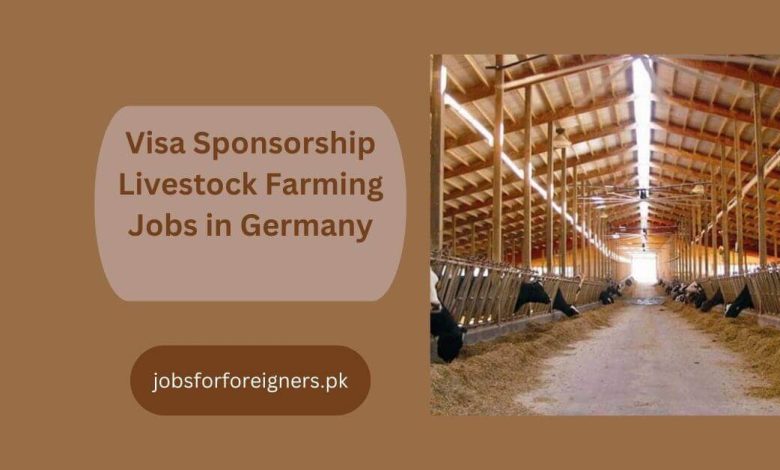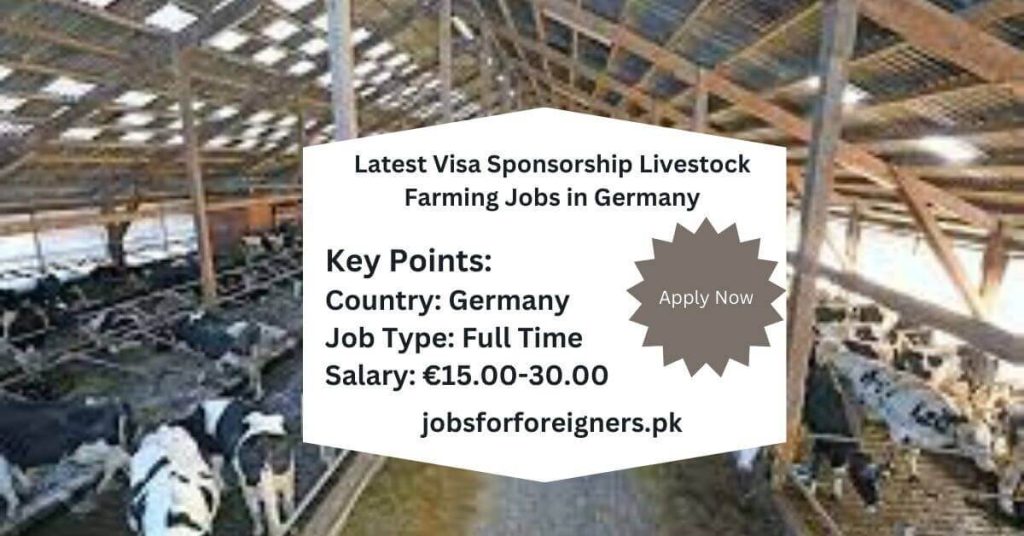Visa Sponsorship Livestock Farming Jobs in Germany 2025

In 2025, Germany’s agricultural sector continues to offer numerous opportunities for international workers in livestock farming, encompassing roles such as animal caretakers, dairy workers, and livestock managers. These positions often come with visa sponsorship, facilitating legal employment for non-EU nationals. Employers typically assist with the visa application process, including providing necessary documentation and support. While prior experience in animal husbandry is advantageous, many employers offer training for suitable candidates. Proficiency in German is often required, especially for effective communication in rural settings. Salaries for these positions vary based on experience and location, with many employers offering additional benefits such as accommodation, meals, and health insurance. These roles not only provide employment but also offer a chance to immerse oneself in Germany’s rich agricultural traditions and rural lifestyle.
Check Also: Visa Sponsorship Chief Executive Officer Jobs in Germany

Demand for Livestock Farming Jobs in Germany:
The necessity of adhering to stringent directives and maintaining high-quality standards is the primary factor driving the demand for skilled laborers in the livestock husbandry sector. As Germany continues to emphasize ethical and practical agricultural practices, there is a consistent demand for individuals with expertise in farm management, veterinary care, and animal husbandry.
Sponsorship of Visas for Jobs in Livestock Farming:
In order to secure employment in livestock husbandry in Germany, this procedure frequently entails the acquisition of a critical work visa. Employers who recognize the significance of foreign expertise in maintaining the nation’s stringent agricultural standards frequently advocate for visas. The EU Blue Card is designed for non-EU laborers who are exceedingly qualified, while the German Work Searcher Visa is intended for individuals who are actively pursuing employment.
Benefits:
- Quality of Life:
Germany consistently ranks highly on global quality of life rankings. A well-developed infrastructure, excellent healthcare, and a high standard of living are all qualities that animal husbandry experts can appreciate. - Cultural Experience:
The opportunity to fully immerse oneself in the affluent German culture, which encompasses everything from the vibrant art scene to traditional festivals, is an intriguing aspect of working in Germany. - Modern Facilities:
Germany’s livestock husbandry is distinguished by its advanced, efficient facilities that employ state-of-the-art innovations to enhance efficiency and animal welfare. - Environmental Sustainability:
Germany places a high value on economic cultivation. Individuals employed in animal husbandry have the opportunity to contribute to environmentally friendly practices and be a part of a nation that is dedicated to environmental responsibility. - Education and Training Opportunities:
Germany provides access to quality education and training programs, enabling individuals to enhance their skills and stay informed about the most recent agricultural developments. - Social Security Benefits:
In Germany, employees are grateful for comprehensive social security benefits, which encompass pension schemes, unemployment benefits, and well-being insurance. - Multicultural Work Environment:
Livestock farming positions attract professionals from a variety of backgrounds, which cultivates a multicultural work environment that improves the overall experience. - Job Security:
Individuals engaged in animal husbandry can take advantage of the stability and security that the agricultural sector provides, which is a critical component of Germany’s economy. - Work-Life Balance:
The German work culture prioritizes a healthy work-life balance, allowing individuals in livestock husbandry to appreciate their personal lives while simultaneously pursuing a fulfilling career.
Qualifications and Skills:
- Relevant Education: Livestock husbandry positions frequently necessitate a background in agriculture, veterinary science, or a related field.
- Work Experience: In Germany, managers typically prioritize candidates who have experience in animal husbandry. A substantial advantage may be provided by prior work experience.
- Language Capability: While English may be sufficient for certain positions, proficiency in German is exceedingly advantageous for effective communication in both professional and personal contexts.
- Visa Requirement: Verify and satisfy the visa requirements for employment in Germany. This may involve the acquisition of a Blue Card or a work visa for highly talented employees.
- Health Protections: It is essential for individuals employed in Germany to have a sufficient amount of health insurance coverage. Ensure that you have the requisite health insurance policies in place.
- Job Offer: It may be essential to obtain a job offer from a German manager. The likelihood of obtaining a work visa is increased by the presence of a concrete offer.
- Financial Stability Proof: The provision of financial stability proof demonstrates your ability to sustain yourself in Germany. This may include confirmation of accommodation and bank statements.
- Cultural Flexibility: Exhibit your ability to adapt to the German work culture and way of life. Employers frequently prioritize social adaptability.
- Valid Passport: Guarantee that your visa is valid for the duration of your intended stay in Germany. Verify the specific requirements for passport validity.
- Networking: Your employment prospects can be significantly enhanced by establishing professional associations within the German agricultural sector. Attend industry events and establish connections with professionals to broaden your network.
Obligations in Livestock Farming Jobs:
- Animal Welfare:
- Guarantee the health and welfare of animals by providing them with appropriate nutrition, housing, and medical care. This involves the observation of the health and behavior of animals.
- Breeding Management:
- Oversee the delivery of animals, manage mating forms, and implement breeding programs. Maintain precise records of reproductive activities.
- Management of Herd Health:
- Vaccination schedules, disease prevention measures, and well-being guidelines are implemented to ensure the animals’ overall health.
- Feeding and Nutrition:
Develop and implement balanced feeding strategies for various phases of animal development. Monitor the condition of the feed and adjust the rations as necessary. - Facility Upkeep:
- Conduct routine inspections and maintenance of farm infrastructure, including equine shelters, walls, and equipment. In order to guarantee a secure and efficient work environment, promptly address any necessary repairs.
- Data Acquisition:
Maintain comprehensive records of animal activities, including births, fatalities, and medications for well-being. Exact record-keeping is essential for the management and compliance of farms. - Movement and Management of Herds:
- Ensure that the development of animals is coordinated for a variety of purposes, including transportation, breeding, and sustenance. Conduct appropriate animal handling procedures to reduce the tension experienced by animals.
- Environmental Compliance:
Comply with sustainable cultivation practices and environmental regulations. Supervise the disposal of waste and employ strategies to reduce the farm’s biological impact. - Equipment Operation:
Operate and maintain farm machinery and equipment, including tractors, drainage machines, and feeding systems. - Teamwork:
- Collaborate with farm staff, veterinarians, and other experts to ensure the efficient administration of the animal farm.
- Market Awareness:
Stay informed about the demand for animal items, market trends, and estimations. Modify agricultural practices in accordance with market conditions. - Ongoing Education:
Ensure that you are informed about the latest developments in the industry, technology, and animal husbandry practices. Engage in substantial seminars or training sessions to enhance one’s abilities.
Application Procedure:
- Search for livestock farming positions in Germany by contacting farms directly, using online work portals, or visiting agricultural websites.
- Organize your curriculum vitae to highlight your education and skills, as well as your significant experience in animal husbandry.
- Submit your visa application to the German Consulate or Embassy in your country of residence. Ensure that all required documentation is submitted and that the appropriate fees are paid.
Conclusion:
Livestock farming occupations in Germany offer an interesting opportunity to contribute to a flourishing industry while experiencing the wealthy agricultural legacy of the country. With a combination of relevant capabilities, practical experience, and a commitment to sustainable farming, people can investigate rewarding career ways in this division with the included advantage of visa sponsorship to facilitate their professional journey in Germany.
Frequently Asked Questions:
What job is in highest demand in Germany?The average pay for a Crop Farm Worker is €39,928 a year abnd €19 an hour in Germany. The average salary range for a Crop Farm Worker is between €30,346 and €46,477.
What job is in highest demand in Germany?
According to EUROSTAT, there were over 1.5 million job vacancies in Germany. Among the most in-demand jobs in Germany in 2025 are those in Healthcare, Engineering, IT, and Teaching.
What is the future outlook for agriculture in Germany?
The German agricultural sector is experiencing a significant downturn, with average earnings plummeting by 29% to 77,500 euros. financial year. This stark decline comes on the heels of farmers’ protests that highlighted the ongoing struggles within the industry.



